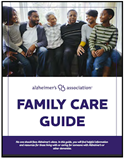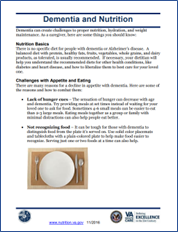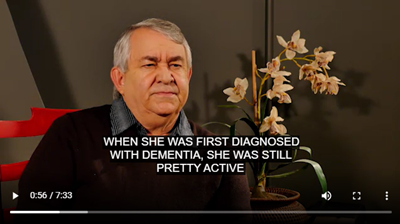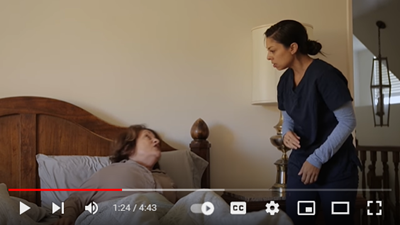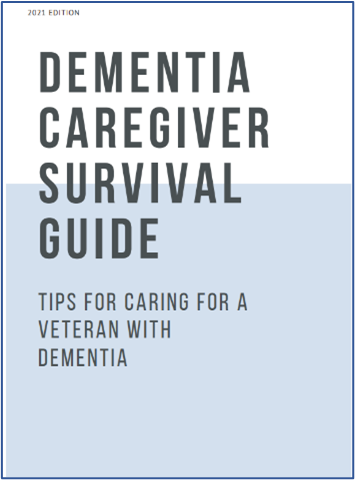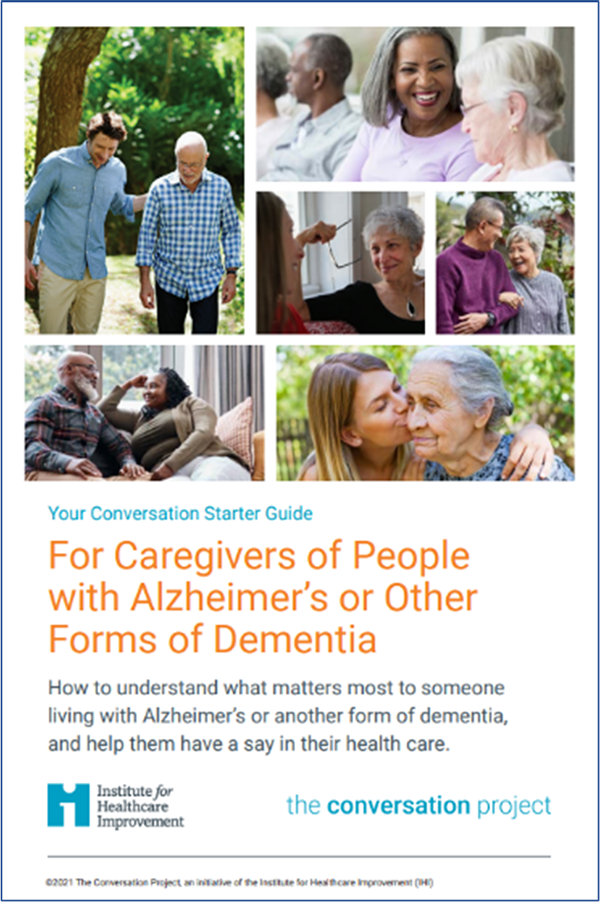Dementia Care (including Alzheimer’s Disease)
Dementia Care (including Alzheimer’s Disease)
Care for Veterans with Alzheimer’s or dementia is provided throughout the full range of VA health care services. Depending on the Veteran's needs, services may include Home Based Primary Care, Homemaker and Home Health Aide, Respite Care, Adult Day Health Care, outpatient clinic, inpatient hospital, Nursing Home, Palliative Care, or Hospice Care. Caregiver Support is also an essential part of these services.
If you’ve been diagnosed with dementia or Alzheimer’s disease or are caring for someone who has, become familiar with the types, stages, symptoms, and treatments. This section of the website provides links to handouts and videos for Veterans and caregivers about Alzheimer’s and other dementias:
- General Resources
- Daily Activities/Symptoms
- Changes in Behavior
- Veterans Health Library Resources
Many of the handouts and videos were compiled and reviewed by staff in the Geriatric Scholars Program, which is supported by Veterans Health Administration’s Office of Rural Health and Office of Geriatrics and Extended Care.
Under the Caregiver/Family Resources Tab there are resources about:
- Communication
- Goals of Care and End-of-Life
- Legal and Financial Matters
- Long Term Placement
And under the Safety and Other Topics Tab there are resources about:
- Home Safety
- Driving
- Emergency Preparedness
- Fall Prevention
- Firearm Safety
General Resources
- Understanding Different Types of Dementia (1 page)
- Understanding Memory Loss (36 pages)
Alzheimer’s
- Next Steps After an Alzheimer’s Diagnosis (2 pages)
- Alzheimer’s Association Family Care Guide (43 pages)
Other Dementias
- A Patient’s Guide to Vascular Dementia (2 pages)
- Frontotemporal Disorders: Information for Patients (36 pages)
Daily Activities/Symptoms
Activities of Daily Living (bathing, grooming, etc.)
- Implementing a Daily Plan (6 minute video)
- Refusal to Bathe (4.5 minute video)
Medication
- Medication Issues for People with Dementia (6 minute video)
- Refusal to Take Medications (4 minute video)
Nutrition
- Dementia and Nutrition (3 pages)
- Dementia: Challenges with Chewing, Swallowing and Self-feeding (3 pages)
Sex and Intimacy
- Changes in Sexuality and Intimacy (2 pages)
- Intimacy in Dementia (7.5 minute video)
Sleep
- Sleep and Older Adults (28 pages)
- Sleep Disturbances (5 minute video)
Staying Active
- Activities for Dementia Patients: Purposeful Activities for All Stages (20 pages)
- Engaging People with Dementia in Meaningful Activities (7.5 minute video)
Travel
- Tips for Traveling with a Loved One with Dementia (2 pages)
- Traveling (3 pages)
Changes in Behavior
Aggression and Agitation
- Agitation and Anxiety (6 minute video)
- Aggressive Language and Behavior (5 minute video)
Anxiety and Depression
- Depression and Dementia (2 pages)
- Depression/Apathy (4 minute video)
Hallucinations
- Hallucinations (4 minute video)
- Paranoid Thoughts (2 minute video)
Repetitive and Inappropriate Behaviors
- Rummaging, Hiding and Hoarding Behaviors (3 pages)
- Minimizing Inappropriate Behavior (7.5 minute video)
- Repetitive Behavior (4 minute video)
- Repetitive Questions (4 minute video)
Sundowning
- Sundowning (2 pages)
- Sundowning (4 minute video)
Wandering
Veterans Health Library Resources
- Understanding Dementia - Get basic information about what dementia is, the stages, and treatments.
- Coping with Your Dementia Diagnosis - Find out how to keep healthy and active, arrange for safety at home and in the community, and plan for the future.
- Caring for Dementia: What to Expect - Learn how caregivers can help with daily life, find new ways to communicate, and cope with problem behaviors.
Veteran and Caregiver/Family Resources
Caregiving
Most of the support provided to older adults and persons with disabilities is provided by unpaid family caregivers and friends. Many caregivers report their health to be worse because of caregiving strain and only half report another unpaid caregiver assists them in their tasks. Few caregivers have care managers to assist with planning and obtaining resources.
Supporting the health and vitality of the caregiver is just as important as meeting the health care needs of the affected person:
- Remind yourself that your work has value
- Find ways to communicate and share your needs with others
- Join a support group
- Be organized, use calendars, gather information on helpful resources and services
- Nurture the positive relationships in your life with family and supportive friends
- Give yourself a break to avoid burnout
- Take care of your own health
Resources for Caregivers
General
- Alzheimer’s or Dementia Caregiver Tip Sheets
- Dementia Caregiver Survival Guide: Tips for Caring for a Veteran with Dementia (66 pages)
Communication
- Tips for Communicating with People with Dementia (2 pages)
- Ten Tips for Communicating with a Person with Dementia (4 pages)
Goals of Care and End-of-Life
- Advanced Dementia: A Guide for Families (50 pages)
- Your Conversation Starter Guide: For Caregivers of People with Alzheimer’s or Other Forms of Dementia (16 pages)
Legal and Financial Matters
- Let’s Talk: Starting the Conversation about Health, Legal, Financial and End-of-Life Issues (8 pages)
- Legal Issues (5 minute video)
- Facing Legal Issues (5.5 minute video)
Long-Term Placement
- Choosing a Nursing Facility (5 minute video)
- Caregiving in a Nursing Home (6 minute video)
To learn more:
Making Decisions
Caregiver Support
Home and Community Services
Whole Health
More resources for caregivers can be found at:
Veterans Health Library
National Alliance for Caregiving
National Family Caregiver Support Program
Safety and Other Concerns
Home Safety
Safety in our homes is critical for those with Alzheimer’s disease or other dementia. While you may not be able to make your home completely safe, there are some easy and low-cost suggestionsto solve the most common safety problems.
These resources provide more details about home safety, emergency preparedness, and fall prevention:
- Home Safety (4 minute video)
- Home Safety Tips (4.5 minute video)
Emergency Preparedness
- Emergency Preparedness (4 pages)
- My Emergency Preparedness Guide: A Caregiver’s Guide for Individuals with Dementia (2 pages)
- Older Adults and Disasters: How Caregivers Can Be Prepared and Assist Others (4 pages)
Driving
Driving ability is a complex task that may be impaired by health conditions common in older adults. In some cases, rehabilitation or vehicle adaptation may be possible to permit continued ability to drive. There may be many reasons to consider a formal driving assessment:
- To obtain a professional opinion to verify your confidence
- To learn new strategies to keep your driving skills sharp in the face of reduced flexibility or reaction time
- To consider rehabilitation for physical limitations
- For advice about how to meet transportation needs if driving is found to be unsafe
Certain illnesses may cause you to stop driving temporarily. If this is the case, a therapeutic program designed by an occupational therapist who is a trained driver rehabilitation specialist may help. The Driver Rehabilitation Specialist will conduct an evaluation and if appropriate may be able to provide assistive equipment such as pedal extenders, seat lifts, panoramic mirrors, and hand controls.
Those with early stages of Alzheimer’s disease or other dementia may benefit from a driving evaluation to determine whether they can continue to drive safely for the time being. People with more advanced stages of dementia should no longer be driving. It is helpful to plan ahead and find alternative modes of transportation such as public transportation or ask friends and family to assist. If you are having difficulty finding transportation resources, talk with your VA Social Worker.
Find the nearest VA Driver Rehabilitation Clinic
This video provides more information about driving and dementia:
- Driving and Dementia (3 minute video)
Firearm Safety
Firearms and other weapons can be found in households across the country. Most service members and Veterans are well-versed in the handling and secure storage of firearms, and in most situations, their presence creates no problems for responsible firearm owners and others in the household.
However, if someone in the home has Alzheimer’s or another dementia, firearms can pose a significant risk for everyone. For example, as the disease progresses, the person may not recognize someone he or she has known for years and view him or her as a threat. An accessible firearm could lead to a tragic outcome. Firearm safety is not only about the handling of a firearm, but also about secure storage.
The following may help to ensure the home is a safe environment:
- Begin with a family discussion with the firearms owner and a trusted loved one about the importance of safely storing firearms while not in use. Consider inviting trusted relatives who have experience safely handling firearms, hunting buddies, etc., to take part in the conversation with the family. Also, be sure that all household members understand the safety guidelines about firearms.
- If possible and in accordance with state law, remove the firearms from the home by selling them or storing them with a responsible individual. If you are unsure of the state laws about firearm ownership or transferring firearms to another person, contact your local law enforcement office for more information.
- If during the discussion you decide that the firearms are going to remain in the home, safe storage means ensuring that firearms are locked and unloaded, and firearms and ammunition are separated when not in use. Ways to safely secure firearms include cable locks, gun cases, and lock boxes. If storing firearms in the home, it’s recommended that you provide keys to a responsible family member who can ensure safe storage.
In periods of crisis or heightened emotions, unsafe firearm storage can increase risk. By learning and practicing safe storage practices before challenging times arise, you can reduce the risk for suicide or injury for everyone in your home.
This handout provides more information about firearm safety for people with Alzheimer’s or other forms of dementia:
Where can I find basic information about dementia for Veterans and Families?
- Go to the Veterans Health Library (VHL) and search for “Dementia”
What are some resources for Dementia Caregiver Support?
- VA Caregiver Support website
- VA Caregiver Support Line: 1-855-260-3274
- VHA GEC Shared Decision Making Guide
- VHA Office of Rural Health Dementia Caregiver Video Series
- U.S. Department of Health and Human Services Alzheimer’s website
- National Institute on Aging (NIA) Alzheimer’s Disease Education and Referral Center (ADEAR)
- U.S. Administration on Aging Eldercare Locator: 1-800-677-1116
Who can I talk to at the VA for help?













